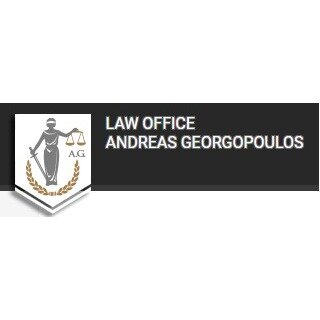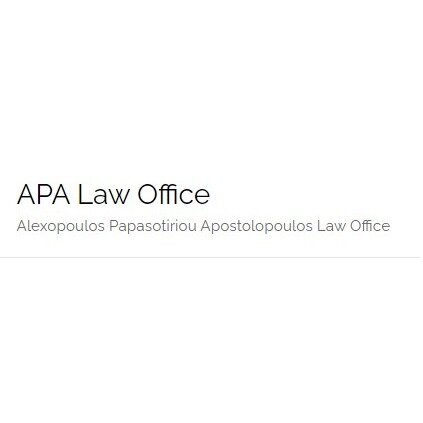Best Faith-Based Law Lawyers in Pátrai
Share your needs with us, get contacted by law firms.
Free. Takes 2 min.
List of the best lawyers in Pátrai, Greece
About Faith-Based Law in Pátrai, Greece
Faith-Based Law in Pátrai, Greece, largely refers to legal matters where religious beliefs intersect with civil law. Greece has a predominantly Orthodox Christian population, and the influence of religious norms can be observed in various aspects of life. Faith-Based Law can cover issues such as marriage, divorce, inheritance, religious freedoms, and the role of religious institutions in society. Despite the secular nature of the Greek legal system, religious considerations can be pivotal in guiding legal decisions in these areas.
Why You May Need a Lawyer
There are several situations where individuals in Pátrai may require legal assistance in the realm of Faith-Based Law:
- Marriage and Divorce: Handling marriages and divorces where religious beliefs and customs play a crucial role.
- Inheritance Disputes: Cases involving intestate succession and the distribution of estates according to religious laws.
- Religious Freedom: Addressing issues related to religious expression and discrimination.
- Property Matters: The acquisition and management of property by religious institutions.
- Compliance: Navigating compliance with both civil and religious legal obligations.
Local Laws Overview
The laws in Pátrai, Greece, reflect a mixture of civil and religious influences due to the significance of the Orthodox Church. Key aspects include:
- Orthodox Church's influence in family law, particularly regarding marriage and divorce proceedings.
- Special considerations for religious holidays and observances within labor laws.
- Tax exemptions and protections for religious institutions under certain conditions.
- Laws against religious discrimination, which ensure freedom of belief and expression for all individuals.
- Supranational considerations, as Greece is a member of the European Union and must comply with EU directives regarding human rights and religious freedoms.
Frequently Asked Questions
What is Faith-Based Law?
Faith-Based Law refers to legal principles and practices that are influenced by religious beliefs and doctrines. In Greece, it often intersects with civil law in areas such as marriage, inheritance, and religious freedoms.
How does the Orthodox Church influence legal matters in Greece?
The Orthodox Church has significant cultural and historical influence in Greece, affecting legal issues related to family life, religious holidays, and certain aspects of the education system.
Can non-Orthodox individuals opt out of religious observances in legal matters?
Yes, non-Orthodox individuals are entitled to their own religious practices and beliefs, and Greek law protects these rights, ensuring freedom of religion and belief.
What role do religious laws play in civil court cases?
While civil law is the primary legal framework, religious laws may influence decisions in cases where the parties have agreed to adhere to religious principles, particularly in family law disputes.
Are religious marriages recognized by the state?
Yes, religious marriages conducted by recognized religious bodies, such as the Orthodox Church, are recognized by the state and have the same legal standing as civil marriages.
How does inheritance law interact with religious principles?
Greek inheritance law follows civil principles, but cultural and religious influences can affect the execution of wills and the distribution of estates, especially among religious families.
What legal support is available for religious discrimination cases?
Individuals facing religious discrimination can seek redress through Greek civil courts, supported by anti-discrimination laws that align with European Union directives.
Do religious institutions have to comply with civil property laws?
Yes, religious institutions must comply with civil property laws, although they may benefit from certain exemptions or privileges under specific conditions.
Are there any special legal considerations for religious holidays?
Greek labor laws consider religious holidays, ensuring employees have the right to observe these days without repercussions from their employers.
What should I do if I need legal advice specific to Faith-Based Law?
It is advised to consult a lawyer specializing in Faith-Based Law to navigate the intersection of civil and religious laws effectively.
Additional Resources
Consider reaching out to the following resources for more information and guidance:
- The Greek Ministry of Justice: Offers information on legal practices and regulations.
- The Orthodox Church of Greece: Provides insights and guidance on religious matters affecting legal issues.
- Local Bar Associations: Can help connect individuals with lawyers specializing in Faith-Based Law.
- Non-Governmental Organizations (NGOs): Such as those focused on human rights and religious freedoms.
Next Steps
If you require legal assistance with matters related to Faith-Based Law in Pátrai, Greece, consider the following steps:
- Identify the specific legal issue you are facing and gather all relevant documentation.
- Research and identify law firms or individual lawyers in Pátrai who specialize in Faith-Based Law.
- Schedule consultations with potential legal counsel to discuss your case and explore your options.
- Ensure that the lawyer you choose has a sound understanding of both civil and religious legal frameworks as applicable to your situation.
By taking these steps, you can effectively navigate the complexities of Faith-Based Law and safeguard your rights and interests within the legal system in Pátrai, Greece.
Lawzana helps you find the best lawyers and law firms in Pátrai through a curated and pre-screened list of qualified legal professionals. Our platform offers rankings and detailed profiles of attorneys and law firms, allowing you to compare based on practice areas, including Faith-Based Law, experience, and client feedback.
Each profile includes a description of the firm's areas of practice, client reviews, team members and partners, year of establishment, spoken languages, office locations, contact information, social media presence, and any published articles or resources. Most firms on our platform speak English and are experienced in both local and international legal matters.
Get a quote from top-rated law firms in Pátrai, Greece — quickly, securely, and without unnecessary hassle.
Disclaimer:
The information provided on this page is for general informational purposes only and does not constitute legal advice. While we strive to ensure the accuracy and relevance of the content, legal information may change over time, and interpretations of the law can vary. You should always consult with a qualified legal professional for advice specific to your situation.
We disclaim all liability for actions taken or not taken based on the content of this page. If you believe any information is incorrect or outdated, please contact us, and we will review and update it where appropriate.












